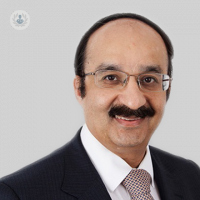Oesophageal cancer: Your questions answered
Escrito por:In the UK, more than 9,200 people are diagnosed with oesophageal cancer each year, which is a cancer that causes extreme difficulty when it comes to swallowing food and even liquids.
Here, renowned consultant gastroenterologist Dr Sameer Zar provides an expert insight into oesophageal cancer, including what changes the cancer causes in the body, and how the cancer is diagnosed and treated.

What happens to the body if it has oesophageal cancer?
Oesophageal cancers involve the gullet (also known as the oesophagus), which is the tube that connects the mouth to the stomach.
Patients who develop cancers of the oesophagus develop narrowing of the gullet that results in difficulty swallowing (dysphagia). Initially, patients will find that swallowed foods get stuck in the oesophagus. Progressively, patients will find that they are unable to swallow soft foods, as well as liquids.
What are the signs of oesophageal cancer?
Difficulty swallowing is the main symptom that patients present with.
Other symptoms of oesophageal cancer include weight loss and regurgitation of food, as well as bringing up lots of saliva. Saliva typically pools in the oesophagus, but oesophageal cancer can sometimes cause patients to bring up lots of saliva, especially as a froth in the morning.
How is oesophageal cancer diagnosed?
The diagnosis of oesophageal cancer is based on the endoscopic evaluation of the oesophagus. This evaluation is called a gastroscopy, and it is usually performed as a day-case procedure.
On the day of the gastroscopy, patients present to the endoscopy unit after fasting overnight. Most patients are then given some form of sedation. An endoscope, which is a long, thin and flexible tube with a small camera on its tip, is put into the patient’s mouth and passed down the gullet.
A gastroscopy allows a specialist to directly examine the oesophagus and reach the area where the tumour is. As well as this, it also allows the specialist to pass small biopsy forceps through the channel of the endoscope, in order to obtain tissue samples. These samples are later evaluated histologically so that a diagnosis can be made.
Is there a specific group of people who may be more prone to oesophageal cancer?
There are two main types of oesophageal cancer: squamous cell carcinoma of the oesophagus and adenocarcinoma of the oesophagus.
Squamous cell carcinoma
This type of cancer is more prevalent in African, Central Asian, Middle Eastern, and Caribbean people, and it is more common in men than in women. Risk factors also include smoking and alcohol.
Adenocarcinoma
This type of cancer has become more prevalent over the last three decades, and it is more common in men of Caucasian origin.
Adenocarcinoma is related to chronic reflux and the development of change in the lining of the oesophagus, from normal squamous lining to Barrett's metaplasia. Barrett’s metaplasia is a pre-cancerous change in the lining of the oesophagus that precedes the development of adenocarcinoma.
How is oesophageal cancer treated?
Unfortunately, most oesophageal cancer are detected late, when patients develop difficulty swallowing. At this point in time, the stage of the cancer is usually advanced. Only a very small group of patients will be diagnosed with early oesophageal cancer.
In view of this, it is thus important to target screening at patients who are at high risk for oesophageal cancer. This includes:
- People who are over the age of 50
- People who have chronic reflux symptoms
- People who are obese
- People who are of Caucasian origin
These patients usually participate in oesophageal cancer screening programmes, where they undergo a series of endoscopy procedures at intervals of three to five years. Studies have shown that, if these patients do develop oesophageal cancer (such as, Barrett’s metaplasia or early cancer), this cancer is usually picked up and diagnosed early.
Early oesophageal cancers can then be treated endoscopically, in a number of patients, using various procedures:
- Endoscopic mucosal resection
- Radiofrequency ablation
- Endoscopic submucosal dissection
What are the survival rates for oesophageal cancer?
At present, the 10-year survival rate for oesophageal cancer is around 15 per cent. This figure relates to the fact that most oesophageal cancers are detected late and as a consequence, the cancer has already spread to either local lymph nodes or to distant organs, which unfortunately results in a poor prognosis.
In order to improve this survival rate, it is essential to try and detect oesophageal cancer at an early stage.
Dr Sameer Zar is a London-based consultant gastroenterologist with over 30 years’ experience.
If you require expert screening, diagnosis and treatment for oesophageal cancer, don’t hesitate to book an appointment with Dr Zar via his Top Doctors profile today.


